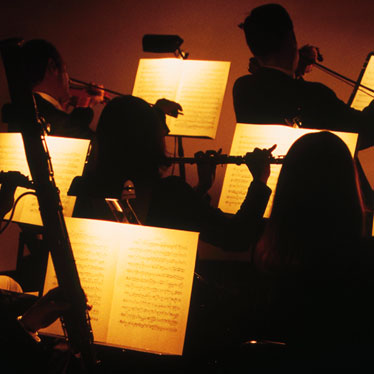Notches On Your Musical Resume: Join A Musical Theatre Pit Orchestra

Looking to expand your skills as a professional musician? To gain experience, many string players take gigs playing in a quartet or band. And although playing in bars, or for weddings and gatherings can offer a great side job and some valuable playing time, if you’re looking for a way to earn notches on your resume, joining a theatre pit orchestra can offer valuable knowledge about earning more professional opportunities.
Musical theatre pit musicians have steady work and it’s a great way to develop a higher level of expertise. The benefits of playing in a theatre orchestra can hone a number of crucial skills, and it looks absolutely awesome on your resume. Because performing with a musical theatre group develops key traits for a career, professional musicians often cite their time in a pit orchestra as an effective step up for their careers.
Build Your Professionalism
Being part of a musical theatre pit helps build your professionalism as a musician in a number of ways. You must be able to be on time and learn to quickly adapt to the group. There is an entire score to learn for a show, and if you can’t get yourself to the pit on-time or early, you’re going to make almost everyone else mad, which won’t bode well for your continued work.
Also, being a pit musician means that you’ll need to be able to take direction accurately. Theatre musicians usually work with a conductor or a designated music director in charge of the style of the music, as in any orchestra. Your job is to be flexible, and play the way you’re instructed. Even if it means doing something differently than you would like, you always agree. This type of malleability shows that you can let others offer instruction, a key skill for professional musicians.
Increase Your Sight-Reading Skills
Pit musicians often get their music a couple weeks before a show opens, or at the last minute. Unlike the actors in the show who have weeks to memorize their lines, you must be able to play the music as soon as possible, and sometimes by sight. This type of job enhances your sight-reading skills through necessity. You must learn to adapt quickly to alterations in the score, or play a completely new piece immediately.
You can increase your sight-reading ability by downloading some apps designed to heighten that capability, but it’s a good idea to get the music as soon as possible. You should also listen to recordings of the piece to familiarize yourself with it, if possible.
Acquire New Abilities, or Hone Those You Have
Playing in a pit orchestra is widely different from playing in a band or quartet. And unlike your school days, you might be the only instrument playing a specific part, so it builds your solo skills and sense of dynamics. Moreover, you acquire a strong grasp of the following marketable skills:
- Superior Intonation—you learn very quickly how to keep your instrument in tune and how to play accurately in tune with the other members of the orchestra.
- Increased Blending—you gain important experience on how to match your style (time, timbre, interpretations) with the surrounding instruments. Creating a cohesive sound is very important to the show, and pit musicians learn to follow direction very quickly, or they’re out.
- The Ability to Play with Click Track—although this is a relatively new addition to pit theatre musicians, a click track generator eliminates variations in the tempo and can be coordinated with other elements in the show, like the lighting and similar special effects. You can learn more about playing with a click track generator here.
- Working as a Team—being in a pit orchestra is like a small family. Everyone has their own tastes, opinions, and personalities, but to be successful, you need to be able to work with them all. This type of team skill is highly marketable for any musician, because a long stint playing for a theatre orchestra indicates that you have the ability to accept direction, receive criticism in a positive ways, and maintain a good attitude.
Earning notches on your musical resume means that you need to include a number of different performance experiences. Playing in a musical theatre orchestra increases your level of professionalism because it builds and showcases a number of specific musical abilities. To add this experience to your resume, simply check out some of the opportunities near you (here and here) and then brush up on your audition skills so you can land your spot.


